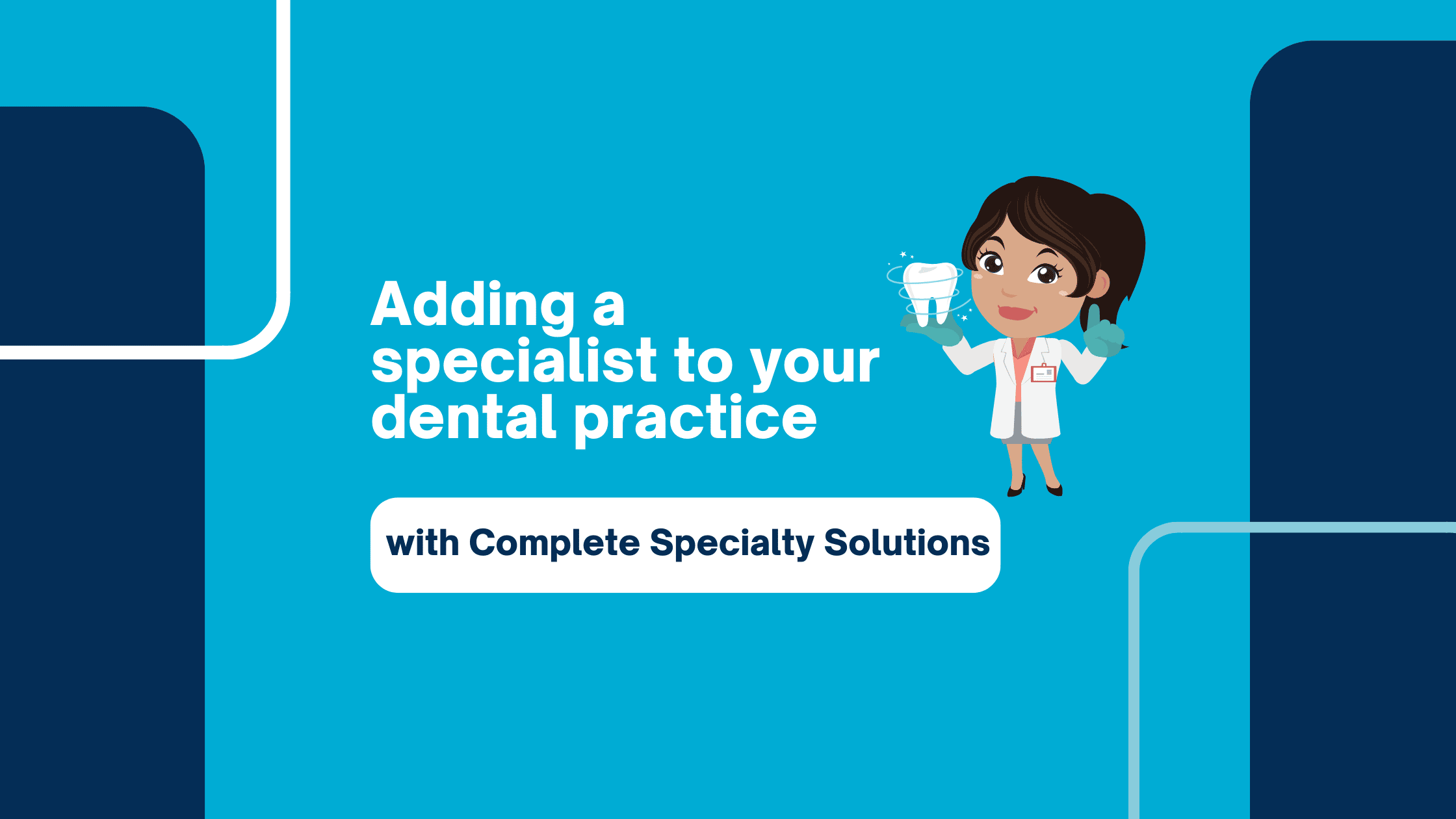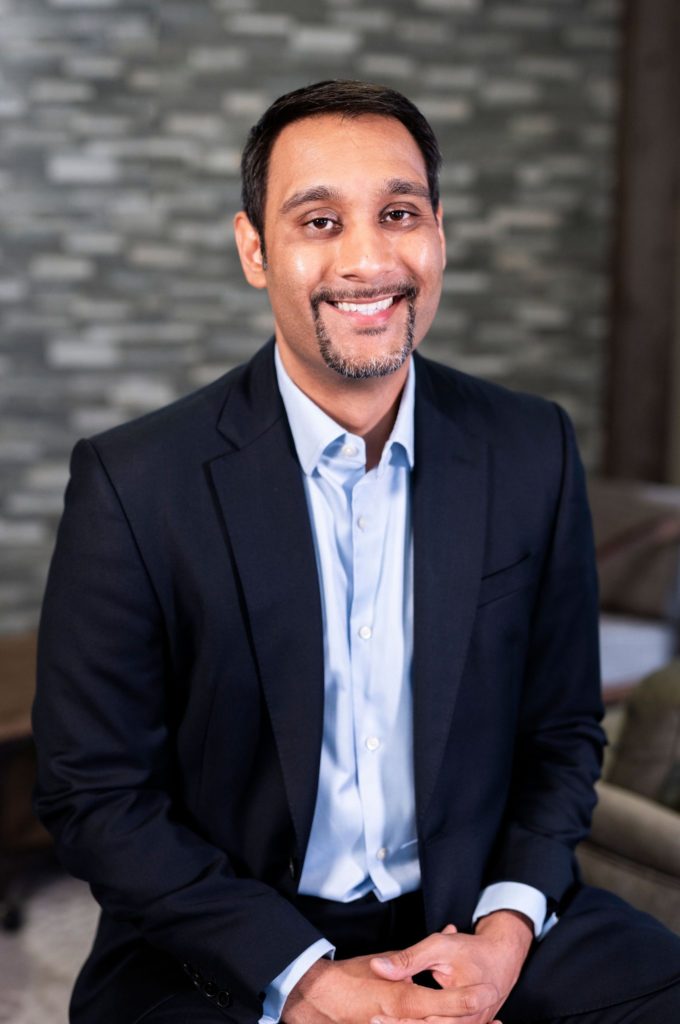Adding a Specialist to Your Dental Practice
Is it time to add a specialist to your dental practice? There comes a time at every dental practice when a patient needs to be referred to a specialist. If you’re a large DSO, you might have access to specialties in house. If you’re a solo practice owner, however, you’ve probably had to refer out […]

Is it time to add a specialist to your dental practice?
There comes a time at every dental practice when a patient needs to be referred to a specialist. If you’re a large DSO, you might have access to specialties in house. If you’re a solo practice owner, however, you’ve probably had to refer out patients to oral surgeons, endodontists, or others.

Complete Specialty Solutions
The thing is, you worked hard to get that patient in your seat in the first place. You invested in dental marketing, built up your network, and created a trusting patient relationship–all to send the patient to another doctor.
“Why can’t I just do the procedure here?” your patient may ask.
Depending on how many specialty treatment referrals you have on a consistent basis, you have a few options:
- You could refer out to a trusted industry partner.
- You could expand your practice to hire a specialist provider.
- Or, you could take a third route: bring in a fractional specialist in house.
To discuss the ins and outs of adding a specialist to your practice, we met with Santosh Patel, President of Complete Specialty Solutions. He talks us through adding a specialist, the idea of a fractional specialist, and how it might help our dental clients.
What are the benefits of having specialty services available at your practice?
- Increase patient retention and case acceptance. When you refer a patient out for a service, there’s always a chance they don’t come back. Offering the service in house is a great way for you to keep patients in your practice. And, patients love the convenience of having a one-stop-shop that handles all their treatment needs.
- Improve continuity of care with your patients. Your patient needs a treatment, and it’s much more likely that they’ll follow through with it if you make it convenient for them. Since you’re collaborating directly with the specialist, you’re better able to ensure quality care.
- Grow your practice with new services. You are better positioned to compete with large DSOs and bigger practices with specialty services under your roof. Leverage marketing to showcase the specialties you now offer in house.
- Generate passive income. By keeping a portion of the referral revenue in-house, you’re actually generating passive income. It’s a win-win. A specialist is providing the care your patients need while your practice enjoys a portion of the treatment fee.
- Add value before you sell. Adding a specialist is a great way to add value to position your practice to sell.
What specialty services should my practice consider adding?
Specialists, just like any other dentists, need the right volume of patients in order to run their businesses. Before a specialist partners with a general dentist, the specialist will need to know that there will be enough cases to make it worth their time.
With that in mind, the first step in determining what specialty you should add is to start tracking how many specialty cases (and which type) you are referring out each month. You can do this with a simple spreadsheet, or you can use software built just for specialty tracking.
The most frequent treatments include:
- Extractions
- Sedation
- Implants
- Root canals
- Brackets and wires
- Clear liners
What are the traditional ways to add specialty services to your practice?
The status quo for many general dentists is to refer out for specialty services. This solution works well if you have trusted industry partners. It’s common for treatments like wisdom teeth extractions, crowns, or orthodontic work. However, the general dentist receives no share of the treatment revenue. There’s also the risk of losing the patient to a competitor who does offer the specialty, or having the patient not receive a necessary treatment because it isn’t convenient to them.
Large dental practices and DSOs often have full time specialists in house to offer general dentistry and specialty services under one roof. They have found that a one-stop-shop for dental services is a great solution for patients. It’s convenient, can improve continuity of care, and helps with retention and case acceptance to have everything in one place. The problem, however, is that this solution is a huge undertaking to many solo practice owners. Adding specialty providers, their teams, and the necessary technology is a large investment.
Here’s the bottom line: It hasn’t always been easy in the dental industry, but there are a lot of benefits to keeping specialty services in house.
Is there a more convenient and affordable way to add a specialist to my dental practice?
Yes! Introducing the Complete Specialty Solutions model: fractional specialists
Complete Specialty Solutions set out to level the playing field for solo practices. Because adding a full time specialist is out of reach for many dentists, CSS provides in-house, fractional specialists to dental practices.
As a turn-key operations agency, CSS’s goal is to reduce the hurdles of adding a specialty. They bring a fractional or “traveling” specialist, a team, and all of the necessary equipment to you.
It’s a way for dental practices to keep both profit and patients in house. For patients, it’s a way to receive a specialty treatment right where they feel most at home–their own dental practice.
How does a CSS bring a fractional specialist to your practice?
CSS works with practices to calculate specialty referrals on a monthly basis. If your general practice has enough referrals in a specialty area, CSS brings in a fractional specialist to handle your specialty cases in-house. Here are some logistics:
- CSS works with local, specialists and dental assistants
- They travel to you, and bring all necessary equipment with them
- They even bring operational team members on site to help with treatment planning, insurance, and billing
- Practices can put in requests for specialty services through the CSS platform so the specialists can communicate with you, understand the case, and see patient history
- Your office retains a portion of the revenue that would otherwise be referred out
- CSS and the individual specialist also receive a portion of the revenue
Check out this video to learn more!
How can a dental practice get started with Complete Specialty Solutions?
Does this sound like a good solution for your practice? You can test it out in a few easy steps. Connect with CSS here. They’ll set up referral software to start tracking how many patients your practice refers out for each specialty procedure. The goal is to find a minimum of four to five patients per month. Practices sign a 30-day contract with CSS. The company wants to make sure it’s a good fit for everyone: practices, specialists, CSS, and especially patients!
At Pain-Free Dental Marketing, we have two common goals with partners like CSS:
- We want to help dental practices grow
- AND we want to allow them to do so while still offering the best possible care to their patients
We are proud to partner with industry experts to find innovative ways to serve our dental clients.